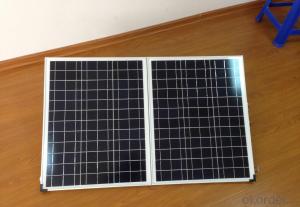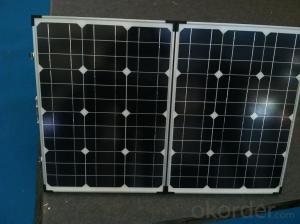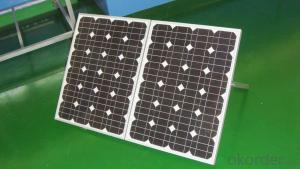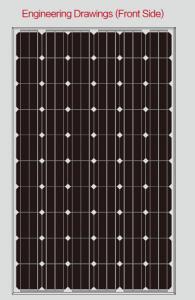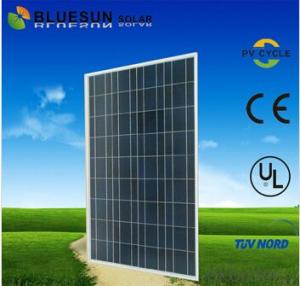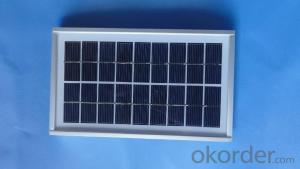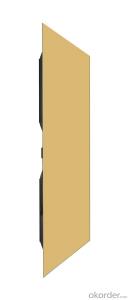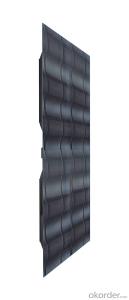Mono 10W Solar Panels Made in China for Sale
- Loading Port:
- Shanghai
- Payment Terms:
- TT OR LC
- Min Order Qty:
- 10000 watt
- Supply Capability:
- 1000000 watt/month
OKorder Service Pledge
OKorder Financial Service
You Might Also Like
Item specifice
Product Description
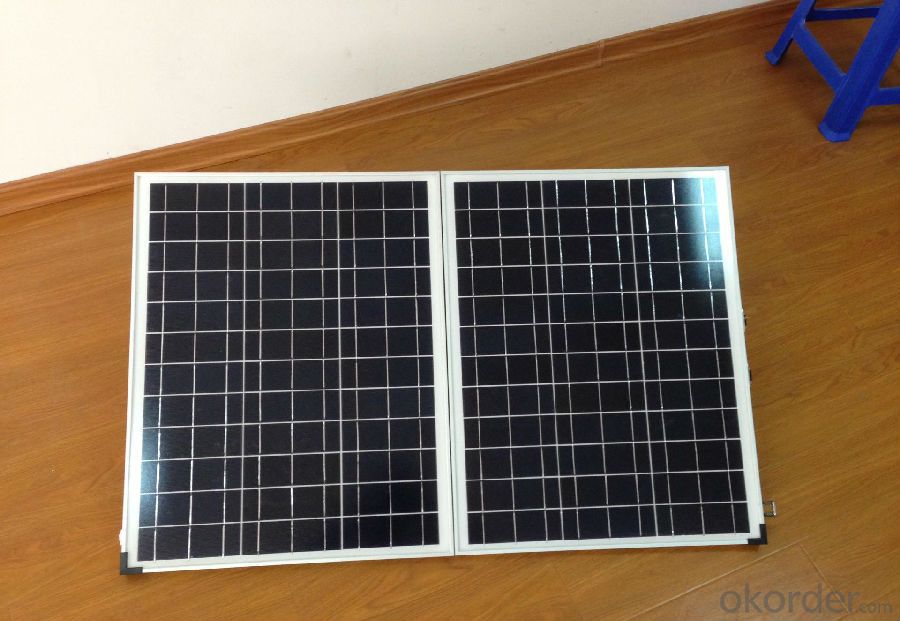 Specifications:
Specifications:
| Rated Max.Power | 10W |
| Rated Voltage: | 17.5 V |
| Open Circuit Voltage: | 21.6V |
| Short Circuit Current: | 0.74A |
| Rated circuit current: | 0.65A |
| Max.System Voltage: | 1000V |
| Dimensions: | 345X285X17 |
Packaging:
Carton, or custom
Advantages
1.Long Service Life
2.High Efficiency Solar Cells
3.Special Aluminum Frame Design
4.High Transmission, Low Iron Tempered Glass
5.Advanced Cell Encapsulation
Solar Panel Application:
1. Solar power station, field operation some huge engineer construction;
2. Living house and home building;
3. Office building, factory and warehouse;
4. other industrial and commercial applications.
FAQ:
1.Price per watt?
It depends on the quantity, delivery date and payment terms.
2.Parameter of the module?
We have different series of panels in different output, both c-si and a-si. please take the specification sheet for your reference.
3.Can you provide the peripheral products of the solar panels, such as the battery, controller etc.?
We have two companies(CNBM International & CNBM engineering Co.) with different approaches. We can supply not only the solar module but also Solar Cells, off grid solar system, even service with on grid plant.
4.Warranty policy?
Our product performance guarantees for 25 years
• 12 years guarantee for workmanship
• Timeliness of delivery
• Quality Products certified (TÜV, UL, CE, ISO)
5.Lead time?
In 3 days after purchasing, we will arrange the factory delivery ASAP. The specific time of receiving is related to the state and position of customers. Commonly 7 to 10 working days can be served.
- Q:Are solar panels suitable for residential use?
- Yes, solar panels are highly suitable for residential use. They provide a sustainable and renewable source of energy, reduce electricity bills, and contribute to a cleaner environment. Additionally, advancements in technology have made solar panels more efficient and affordable, making them a practical choice for homeowners.
- Q:Can solar panels be installed on public parks or gardens?
- Yes, solar panels can be installed on public parks or gardens. In fact, installing solar panels in these areas can be a great way to promote renewable energy, reduce carbon emissions, and generate clean electricity to power nearby facilities or feed into the grid. Additionally, solar panels can provide shade for park-goers and enhance the overall sustainability of the space.
- Q:The inverter I am using gets the required 2 DC volts from the solar panel, but fo some reason it just won't output the 0 AC voltage. When the inverter is hooked to a car battery, it works just fine off the same 2 DC rating. Help me out please...
- There could be a couple of reasons why it isn't working. First, 2V panels actually put out a considerably higher voltage because it is presumed that they will be used to charge a 2Vdc battery. That requires applying a voltage greater than 2Vdc, and usually there is a solar controller that regulates the solar power to the battery. It also has a voltage drop. Look at the first reference reference, and you will see these values for a particular panel: Voc: 2.6V (open circuit voltage) Vmp: 7.2V (voltage at maximum power point) Voc is the voltage the panel produces under standard sunlight and temperature conditions (25°C), with no load applied. As load is applied, the voltage drops (see reference 2). Power is the product of current times voltage, so at one set of conditions (namely at Vmp) maximum power is available from the panel. Your inverter might not be working for either of two reasons: ) it has input protection circuitry that locks out operation when it senses an overvoltage, as in the 2.6V open circuit voltage, or 2) the panel does not produce enough current and the voltage from the panel collapses under excessive load. For example, if you load your inverter to 20W, then nominally the 2VDC input to the inverter must supply 20W/2V/eff = 0A/eff Assuming the inverter has an efficiency of 80%, the input current required is: 0A/.8 = 2.5A A solar panel operating at maximum power would need a rating of about: 2.5A x 7.2V = 25W Is your panel that big? The other option, as mentioned by others, is to charge a battery that runs the inverter. Other nuances: Voc increases as temperature decreases. Sunlight intensity varies (obviously), so the panel may produce less than rated power. The power specifications often are printed on the back side of the panel.
- Q:hi so im doing a school project thing and they have a lot of different questions for us that help us decide whether we would rather a city have a nuclear reactor, or solar panel. But i cant seem to get the last 2 questions...help please???so question ........What types of emissions, if any, are produced by each type of generating station? Do these emissions affect human health?question 2.....What are the long term financial costs associated with maintaining each type of generating station?thanks!
- You should research nuclear reactors and their emissions. Mostly it's waste heat, and if they use a water-based cooling reactor, there can be significant emissions of water vapor. Some might consider the spent fuel an emission too. Waste nuclear material disposal is a problem. Research it. Solar panels have no emissions during operation, but there is some nasty stuff emitted when they are manufactured. 2: Maintenance of solar panels is pretty straightforward: keep them clean, trim overhanging trees, shrubs, etc., check for and clean corrosion, contaminants, etc. regularly. Maintenance of nuclear power plants, so far, is a full time job for many technicians and engineers. The recently developed portable (the size of a shed) nuclear generators claim zero maintenance for 20+ years. That's a big improvement.
- Q:Can solar panels be used in areas with high levels of hurricanes?
- Yes, solar panels can be used in areas with high levels of hurricanes. However, it is crucial to ensure that the solar panel installation is designed and built to withstand strong winds and other extreme weather conditions. This can be achieved through proper engineering, using sturdy mounting systems, and adhering to local building codes and regulations.
- Q:If a solar panel (using 36 3x6 solar cells) puts out 60 watts, how many panels would I need (for a house) if I use a max of 2300 kWh in a month? I checked my electric usage for the past 2 years and the kWh is usually lower but I wanted to use the most kWh used (2300) for my question. Thanks!
- One key piece of information missing is the average number of peak sun hours per day. This will vary by location. It is latitude, regional weather, and site shading must be considered. Another consideration is the loses. The 60 watt solar panel is a DC voltage. The 2300 kWh is for the AC power consumed. There are loses in the inverter to change the electricity from DC to AC. There are also loses for wire resistance, soiling of the panels, wire resistance, etc. To work out an example of the math, I'll use 5 peak sun hours and a total efficiency of 80%. The math can be worked out as a single formula but I'll break it into steps for you. (2300 kwh/month)(month/30.4 days) = 75.65 kWh/day (60 W)(5 psh)(80%) = 240 Wh/day = 0.24 kWh/day/panel # of panels needed = Energy use / Energy generated (75.65 kWh/day) / (0.24 kWh/day/panel) = 36 panels.
- Q:I know that if I put solar panels in my home I will get 30% back from the govt. Does that mean if I pay 2K I will get back around a 3K check? Or will my income play a roll where I may not get back as much?
- Not a good answer: CNBC had a news bit, that it can take 0 to 20 years for you to break even in energy costs after installing solar panels. Please don't buy them just for the tax deduction. See if you can google a calculator for this - do research. I have a brother in law that buys anything under the sun just because he gets a tax deduction. I'm sure you're not like that though. Run the numbers of what you will save vs the 2K you will spend You may never break even
- Q:wondering if i should get them?? not sure if its worth leasing? also anyone know anything about solar city?
- Solar panels can be worth it but it is more complex issue than that. It will always be more efficient to add insulation, change to high efficiency lights, more efficient appliances, etc, first to try and save energy. However, if you have done all of that and you have a south facing area whee they could be mounted and you live in an area with a decent amount of sun, then they could pay off. I have no experience myself with Solar City, but I know from word of mouth they are good. I can recommend from first hand experience REC Solar. I have 20 of their panels on my south facing roof. They have a leasing deal or a deal where you buy the system outright (which is what I did) but for less than you might think. I'd be glad to help you if you had any other questions.
- Q:We have LED at the output of 40 watts and is used for 0 hours giving us 400 Watts-hr of energy consumed.Rechargable batteries needed are 2 V. 400/2 gives us 34 Ampere-hour battery needed. If we want it for 3 days, It would be 34x3=00 Ah. So the battery needed 00 AhNow how do I select the solar panel which can charge this/these batteries? What should be its rating?
- First, you need to make sure that your battery can take a regular 34Ah discharge without damage. The usual wisdom when using deep cycle lead-acid batteries is to allow for no greater than 50% discharge. This is to prevent the battery from ageing prematurely. Note that automotive batteries are not usually considered suitable for deep-cycle applications. Best allow for at least 200Ah capacity. Your solar panel capacity needs to take into account that whatever the nameplate output of the panel, that will be what it will produce under ideal conditions, actual output will always be less, often quite a bit less. You also need to allow capacity to cope with dull, overcast days when the light level is very low. You can get solar maps that will give you the sunshine hours and irradiation levels at your location. The solar panel capacity ends up being a juggling act between available funds/space and how critical it is that the light always works as desired. Let's say you had a 400W panel, which sounds quite generous. In the middle of winter, it may produce only 75W for 5 hours on a dull day, not quite enough to run the light for 0 hours. Would you expect several such days in a row? How many days could a 00Ah of battery capacity cover under these conditions?
- Q:Can solar panels be integrated into windows?
- Yes, solar panels can be integrated into windows. This innovative technology is called Building Integrated Photovoltaics (BIPV), where solar cells are incorporated into the glass panels of windows. BIPV allows for the generation of renewable energy while still maintaining the functionality and transparency of windows.
1. Manufacturer Overview |
|
|---|---|
| Location | |
| Year Established | |
| Annual Output Value | |
| Main Markets | |
| Company Certifications | |
2. Manufacturer Certificates |
|
|---|---|
| a) Certification Name | |
| Range | |
| Reference | |
| Validity Period | |
3. Manufacturer Capability |
|
|---|---|
| a)Trade Capacity | |
| Nearest Port | |
| Export Percentage | |
| No.of Employees in Trade Department | |
| Language Spoken: | |
| b)Factory Information | |
| Factory Size: | |
| No. of Production Lines | |
| Contract Manufacturing | |
| Product Price Range | |
Send your message to us
Mono 10W Solar Panels Made in China for Sale
- Loading Port:
- Shanghai
- Payment Terms:
- TT OR LC
- Min Order Qty:
- 10000 watt
- Supply Capability:
- 1000000 watt/month
OKorder Service Pledge
OKorder Financial Service
Similar products
New products
Hot products
Hot Searches
Related keywords
